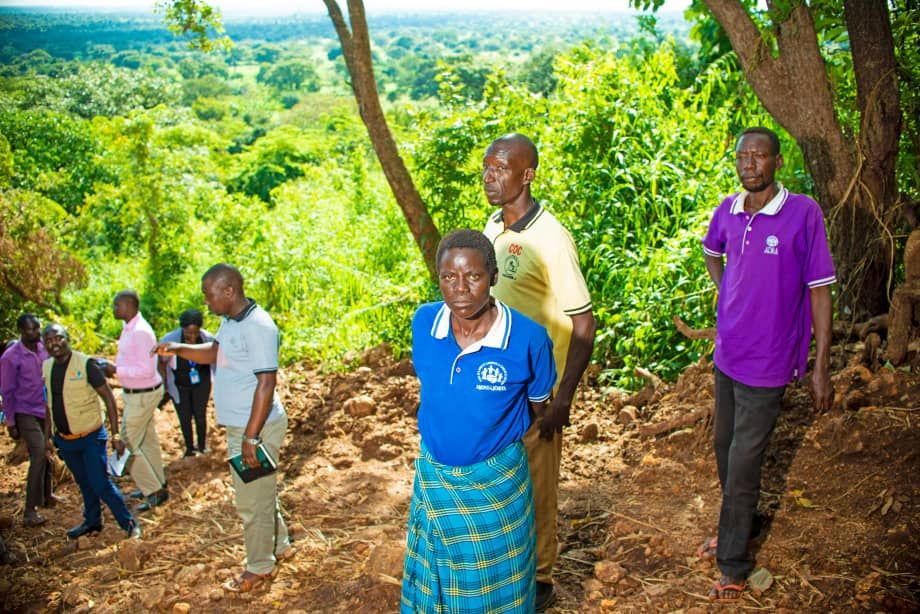By Akello Gladys Evarine, NCF – Programme Officer – Protection & GBV
Email: gladys.akello@nwoyacharity.org
In the quiet villages of Nwoya, the bustling trading centers of Amuru, and the resettlement communities of Pader and Lamwo, a silent crisis is tearing families apart: Gender-Based Violence (GBV). Often spoken of in hushed tones—or not at all—GBV has become an alarming epidemic in Northern Uganda. It is not only affecting women and girls but also leaving deep, long-term scars on children and the fabric of society.
According to recent reports from Uganda Police and the Ministry of Gender, Labour and Social Development, the Acholi sub-region—including districts like Nwoya, Amuru, Omoro, Kitgum, Pader, and Lamwo—records some of the highest incidences of GBV in the country. These include domestic violence, defilement, early and forced marriages, emotional abuse, and economic violence.
The children are not just witnesses—They are victims Too
In homes plagued by GBV, children often become the invisible victims. When a child grows up witnessing violence—between parents or caregivers—it affects their mental, emotional, and even physical development. Studies have shown that:
- Children exposed to domestic violence are more likely to develop depression, anxiety, and aggressive behavior.
- Many of these children perform poorly in school or drop out altogether, particularly girls who may be forced into early marriage.
- In some tragic cases, children themselves become direct victims of physical or sexual violence, often from family members or guardians.
A child in Lamwo who watches his mother being beaten every night learns that violence is normal. A girl in Omoro who is married off at 14, against her will, loses her right to education and childhood. A boy in Kitgum who flees an abusive home ends up on the streets, vulnerable to exploitation.
These are not rare stories—they are daily realities for too many families.
Key drivers of GBV in Northern Uganda
Several factors contribute to the prevalence of GBV in this region:
- Poverty and economic stress often trigger domestic tensions and power imbalances.
- Cultural norms and gender inequality continue to place women and girls in subordinate roles, with limited decision-making power.
- Post-conflict trauma and displacement from past insurgencies have weakened traditional family structures and support systems.
- Alcohol and substance abuse, particularly among men, has been cited in many cases of intimate partner violence.
- Weak enforcement of laws and limited access to justice, especially in rural areas, allow perpetrators to act with impunity.
Recommendations for government and Civil Society Organizations (CSOs)
- Strengthen community-Based GBV prevention programs: CSOs and government actors must work together to train community leaders, male champions, youth groups, and women’s associations to raise awareness, challenge harmful gender norms, and provide local support systems.
- Improve access to justice and legal support for survivors: Establish and strengthen gender desks at police stations, mobile courts, and legal aid services across these districts to ensure timely justice and protection for survivors.
- Expand psychosocial support and safe spaces: Provide trauma counseling, safe shelters, and referral services for survivors—especially for children and adolescents who witness or endure violence.
- Enforce laws against child marriage and defilement: Local governments must commit to strict enforcement of the Marriage Act and Children’s Act, and communities must be educated about the rights of girls to live free from early marriage and exploitation.
- Integrate GBV education into schools and health services: Health centers and schools should incorporate GBV screening, education, and reporting mechanisms, while equipping staff to handle sensitive disclosures.
- Promote economic empowerment for women and families: Poverty is both a cause and consequence of GBV. Supporting women through microfinance, skills training, and livelihood programs can reduce dependency and give survivors pathways to freedom.
Conclusion: healing must begin at home
Gender-Based Violence is more than a personal tragedy—it is a public crisis that demands a multi-sectoral response. In Northern Uganda, where the wounds of conflict are still healing, we cannot afford to ignore the silent suffering behind closed doors. Families are the heart of every community, and children are its future. When violence breaks the home, the entire society bleeds.
It is time for action—from policymakers, religious and cultural leaders, NGOs, and citizens alike. Together, we must rewrite the story of Northern Uganda—one where girls grow up safe, children thrive, and families heal.
Speak up. Support survivors. Break the cycle.
NCF Funding Appeal: Averting GBV and Protecting Families in Northern Uganda
Gender-Based Violence (GBV) remains one of the most urgent yet underfunded crises facing families in Northern Uganda. In districts such as Nwoya, Amuru, Omoro, Pader, Kitgum, and Lamwo, GBV is not only destroying lives—it is destabilizing communities, traumatizing children, and perpetuating cycles of poverty and inequality.
At Nwoya Charity Foundation (NCF), we witness firsthand the devastating impact of GBV: women fleeing violent homes, young girls forced into early marriages, children living in fear and shame, and survivors left without support or justice.
We are calling on development partners, philanthropists, foundations, and concerned individuals to partner with us in a coordinated effort to prevent GBV, protect survivors, and promote healing in Northern Uganda.
With your support, NCF will:
- Establish community-based GBV prevention programs that engage men, women, youth, and traditional leaders.
- Support safe shelters and psychosocial services for survivors and their children.
- Train community volunteers, teachers, and health workers to identify, respond to, and refer GBV cases.
- Run school and radio campaigns to raise awareness on children’s and women’s rights.
- Provide legal aid and strengthen referral pathways in partnership with police and local courts.
- Support economic empowerment programs for women and at-risk families to reduce vulnerability to violence.
Your funding can help us break the silence, restore dignity, and build safer, more resilient communities.
Together, we can avert GBV and safeguard the future of Northern Uganda’s children and families.
📩 To support this cause or request a detailed proposal, contact us at:
📧 info@nwoyacharity.org
📞 +256784004631
🌍 www.nwoyacharity.org
